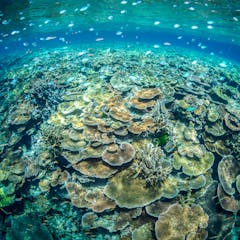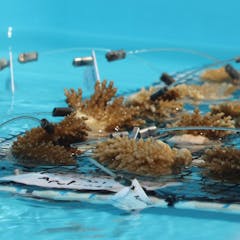
Articles on Marine heatwaves
Displaying 1 - 20 of 67 articles

Heat is surging in the world’s oceans. Climate change and El Niño explain part of it – but not all.

In 1898, a pioneering Antarctic expedition was stuck in sea ice for over a year. In 2024, that area is open water.

Artificial reef stars have been added to damaged coral reefs in Sulawesi, Indonesia. A new study shows that within just four years, restored reefs are thriving as much as healthy reefs.

The best strategy to protecting Earth’s coral reefs is to dramatically cut greenhouse gas emissions. But in the meantime, we must urgently make corals more resilient.

In the Mediterranean, heat waves are decimating underwater forests that are essential to ecosystems. The gorgonians seem to be better able to resist in the depths, but this refuge may only be temporary.

Floodwaters pulsing into the sea normally clear within six days. But the 2022 floods in eastern Australia were different.

Experimenting with climate messaging reveals the best ways to inspire individual action. Here’s how to talk about the Great Barrier Reef this summer.

Giant eddy currents in the sea spread heat. But if trapped in place, they can cause marine heatwaves deadly to sea life. And there’s a big one shaping up off Sydney right now.

Climate assemblies may just provide the breakthrough required to develop popular, just and sustainable climate and energy policies.

New Zealand’s kelp forests provide food and shelter for many marine species of commercial and cultural value. But they are at risk from warming oceans, run-off from land and marine invaders.

Marine heatwaves aren’t just on the surface. They can be at their most destructive when they sweep along the seafloor.

Exploring the often unseen, and poorly understood, nuances of diversity within coral reefs may prove essential for ensuring the long-term health of Earth’s oceans.

We used to focus just on protection of vital ecosystems like the reef. But as climate change and other threats accelerate, we need to actively help nature get ready for the heat.

Ocean temperatures have hit record highs off the Florida Keys. Scientists and volunteer divers are racing to save these valuable creatures.

Incrementalism and politics as usual cannot save the Barrier Reef from the largest threat it faces – the heat ramping up from climate change

Water temperatures in the 90s off Florida in July are alarming, a NOAA coral scientist writes. Scientists in several North American countries have already spotted coral bleaching off their coasts.

The world’s oceans are getting hotter, quicker. And our marine species are seeking cooler waters. Keep your eyes peeled and you might spot one of these species on the move.

Seagrasses need light to remain resilient to marine heatwaves – water pollution disrupts that balance.

A thin layer of surface water has been baked by the sun.

The 2021 Pacific Northwest heatwave outstripped even the most severe climate prections. A new study simulated 45,000 years of weather at Seattle Tacoma airport to try and figure out why.
